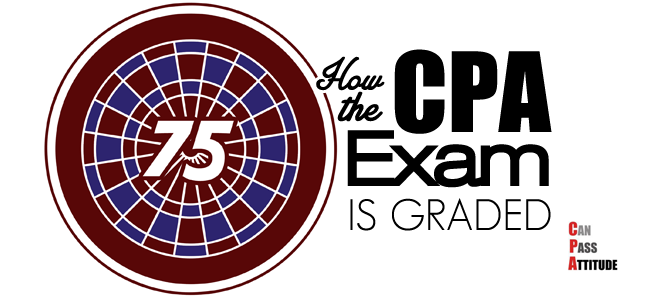- You are here:
- Home »
- Blog »
- CPA Exam Details »
- How to Understand the CPA Exam Grading System (Is It Curved?)
How to Understand the CPA Exam Grading System (Is It Curved?)

How is the CPA Exam graded? Candidates are intrigued by CPA Exam grading. So, I’ll give you my understanding of the CPA Exam scoring mechanism and CPA grades release.
What is a Passing Grade on the CPA Exam?
For each section of the 4-part test, a CPA Exam passing score is 75. The passing score is set by the AICPA’s Board of Examiners with input from NASBA and existing CPAs.
A CPA Exam Score of 75 Isn’t 75% Correct
 First of all, you should know that your CPA score is not equal to the percentage of correct answers on your exam. For example, if you get a CPA Exam score of 75, it does NOT mean that you got 75% correct.
First of all, you should know that your CPA score is not equal to the percentage of correct answers on your exam. For example, if you get a CPA Exam score of 75, it does NOT mean that you got 75% correct.
CPA Exam scores are calculated based on a percentile. Additionally, the examiners utilize a fancy system to calculate CPA scores. Here is a summary of how CPA Exam scoring works in layman’s terms. After all, when you understand the CPA grading system, you are better prepared to pass the CPA Exam.
CPA Exam Grading in Layman Terms
1. Pre-test questions
A typical CPA Exam has a certain number of “pre-test” questions. These questions look exactly the same as others (i.e. candidates can never know). However, they are not graded for that specific exam. Instead, these questions are being tested for use on future exams. So your performance on the pre-test questions is not factored into your final score.
2. Adaptive testlets
Each of the four exam sections tests your knowledge through a series of “testlets.” Testlets either have all multiple-choice questions (MCQs) or task-based simulations (TBSs or SIMs).
You’ll start with an MCQ testlet. Testlets are labeled as either “medium” or “difficult” based on the difficulty of the questions. More of the easier questions will fall into the “medium-level” testlets. Similarly, a larger number of harder ones will fall into the “difficult” testlets. On exam day, the first testlet you’ll see will be a medium one.
The MCQ testlets are adaptive. Therefore, candidates will be given a medium-level or difficult testlet depending on how they do on the previous testlet. So if you really ace the first medium testlet, you’ll be given a difficult one next. Conversely, if you bomb the first testlet, you’ll see another medium one next.
3. How is the CPA Exam graded: Testlets
 The MCQ testlets are graded a little differently than the simulations, so I’ll explain both.
The MCQ testlets are graded a little differently than the simulations, so I’ll explain both.
Each question is assigned a point value based on its level of difficulty. The difficult questions have a higher point value, and the easier ones have a lower value. The exam is “positively graded,” meaning you only get points when you answer correctly. Moreover, you aren’t nicked for incorrect answers.
Therefore, even if candidates get more wrong answers in the difficult testlets, they may still be better off than those who “got stuck” in the medium-level testlet.
Grading the MCQs
In the MCQ sections, you’re asked to select the best answer out of four choices. Since there is only one correct answer, you either get MCQs right or wrong—the exam doesn’t award partial credit for any MCQs.
How are simulations graded on the CPA Exam?
The MCQs are graded a little differently from how CPA SIMs are graded. After all, each simulation problem could have multiple “answer” inputs. For example, a simulation might ask you to do some computations regarding a journal entry. Then, once you’ve solved the problem, you must insert answers into several boxes in that sample entry. So therefore, you could input more than one “answer” in a simulation. In fact, you might have to input up to 5, 6, or 7 pieces of information in a simulation.
So unlike the MCQ questions, the graders award partial credit for simulations that require multiple inputs. Therefore, it’s important to never leave any box blank. Even a total guess is better than leaving something completely blank.
What It Means to You
- The CPA Exam grading curve is a myth. Furthermore, the examiners do not subjectively manipulate the test and passing rate. However, the grading system is scaled. That is, it considers both your response and the difficulty of the question. Therefore, your score is not dependent on other candidates’ performance. Your score is only based on your responses and how you did on the medium versus difficult questions.
- Plus, if you feel like you got several questions wrong, you may still pass because the difficult questions get more weight.
- And finally, remember that two candidates can get the same number of questions correct but end up with different scaled scores depending on how they performed on each individual question and its value.
CPA Grade Release Dates 2025
Usually, the CPA score release dates are 2-4 weeks after you take the exam. Here are the CPA Exam score release targets for 2023.
2025 CPA Exam Core Sections – Score Release Dates
| Date the AICPA Receives Your CPA Exam File | Target CPA Exam Score Release Dates |
| January 23 | February 7 |
| February 14 | February 25 |
| March 9 | March 18 |
| March 31 | April 9 |
| April 23 | May 8 |
| May 16 | May 28 |
| June 8 | June 17 |
| June 30 | July 10 |
| July 23 | August 7 |
| August 15 | August 26 |
| September 7 | September 16 |
| September 30 | October 9 |
| October 23 | November 7 |
| November 15 | November 25 |
| December 8 | December 16 |
| December 31 | January 13 |
2025 CPA Exam Discipline Sections – CPA Score Release Timeline
| CPA Discipline Testing Window | Target CPA Exam Score Release Date |
| January 1-31 | March 14 |
| April 1-30 | May 16 |
| June 1-30 | July 17 |
| July 1-31 | September 11 |
| October 1-31 | December 16 |
CPA Grade Release Dates 2024
Here are the CPA Exam score release targets for 2024, after the 2024 CPA Exam changes are implemented.
| Take the CPA Exam Core sections (AUD, FAR, & REG) on or before: | Target CPA grade release: |
| March 26, 2024 | June 4, 2024 |
| June 25, 2024 | July 31, 2024 |
| Take the CPA Exam Discipline sections (BAR, ISC, & TCP) on or before: | Target CPA grade release: |
| February 6, 2024 | April 24, 2024 |
| May 19, 2024 | June 28, 2024 |
Should I Appeal My CPA Grade?
If you think there is an error in your CPA grade, you can appeal your score or request a score review. But first, you should be aware of certain limitations and fees.
First, a score “review” request ensures that the correct answer key was used to grade your CPA Exam. A score review rarely results in a score change, so you should only request one if you think the totally wrong template was used to grade your work. Just contact your board of accountancy to start the process.
Second, some jurisdictions allow “appeals,” which are quite different from score reviews. You can only appeal a failing score. In an appeal, you set an appointment at a secure authorized location. A representative from your board of accountancy must be present. Then, you’re allowed to see the MCQs and simulations you missed and your responses. After that, if you would like to contest the validity of an answer, you can do so via an online platform. Moreover, you must provide a complete and persuasive defense of any responses marked as incorrect.
The fees for score reviews and appeals vary by state, but you can check with your state board’s requirements.
FAQs
Who grades the CPA Exam? Is the CPA Exam graded by hand?
The simulations and MCQs are graded by a computer software program that is calibrated and tested by human examiners.
What is the score needed to pass the CPA Exam?
A CPA passing score is 75. Therefore, you need a 75 or higher on each section of the 4-part exam to pass.
How is the CPA Exam graded for simulations?
A lot of readers contact me asking about how are SIMs graded on the CPA Exam. They are graded positively, and you get credit for each portion of a question that you answer correctly.
Research simulations are the only exception. You either get a research question right or wrong; no partial credit is awarded for this type of simulation.
Is the CPA Exam curved?
No, the CPA Exam is not curved. Your score is based on your responses and each question’s scaled value. Moreover, your CPA Exam score percentiles are only based on your performance, not on the performance of fellow CPA candidates.
For Your Further Reading
- Should I take live classes or self-study courses?
- When can I see my exam results?
- Is there anything I should do after the exam?
Are You Walking Alone in Your CPA Journey?
I am here to help! Check out my frequently asked questions page, or sign up for my e-course, where I deliver the most important posts from this site in an organized manner.
Please select the version most suitable for your needs:
 |
 |
| For US Candidates (Those with US degrees, or graduate/live/work in the US) |
For Intl Candidates (Those who study abroad, or graduate/live/work outside of the US) |
About the Author Stephanie Ng
I am the author of How to Pass The CPA Exam (published by Wiley), and I also passed all 4 sections of the CPA Exam on my first try. Additionally, I have led webinars, such as for the Institute of Management Accountants, authored featured articles on websites like Going Concern and AccountingWeb, and I'm also the CFO for the charity New Sight. Finally, I have created other accounting certification websites to help mentor non-CPA candidates. I have already mentored thousands of CPA, CMA, CIA, EA, and CFA candidates, and I can help you too!

